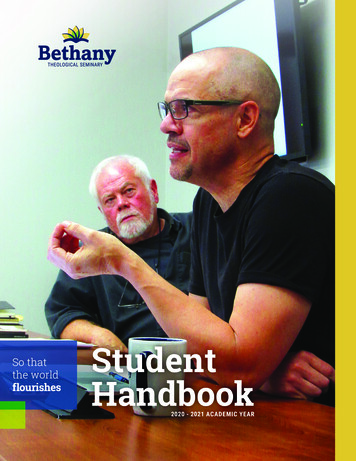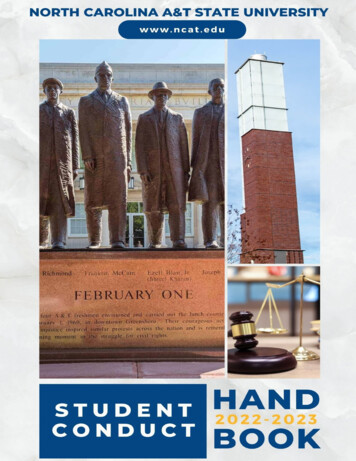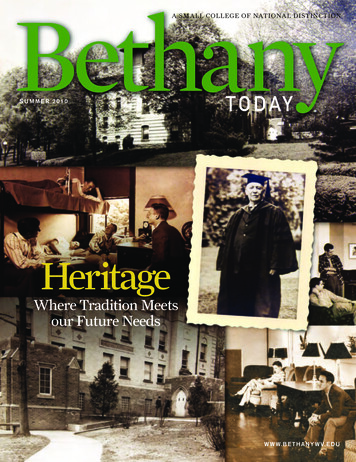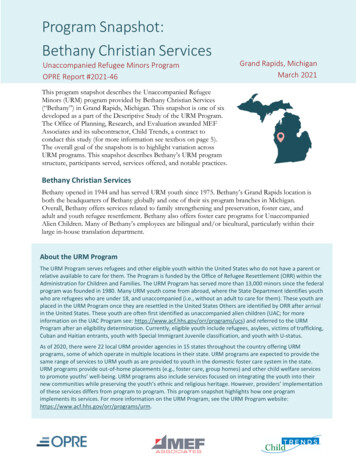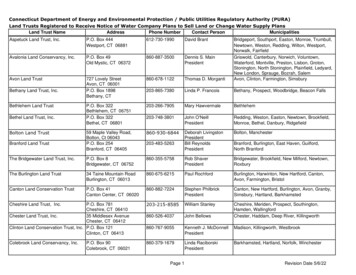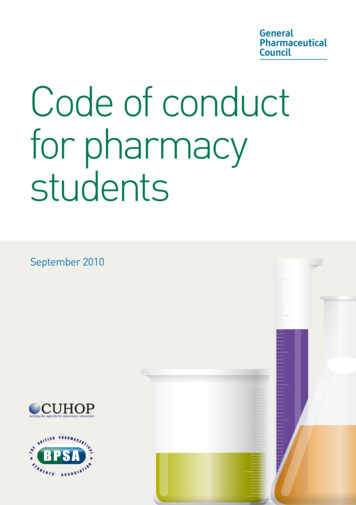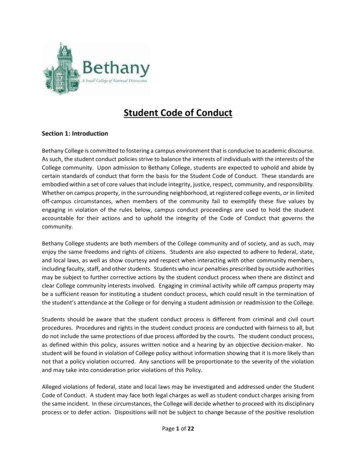
Transcription
Student Code of ConductSection 1: IntroductionBethany College is committed to fostering a campus environment that is conducive to academic discourse.As such, the student conduct policies strive to balance the interests of individuals with the interests of theCollege community. Upon admission to Bethany College, students are expected to uphold and abide bycertain standards of conduct that form the basis for the Student Code of Conduct. These standards areembodied within a set of core values that include integrity, justice, respect, community, and responsibility.Whether on campus property, in the surrounding neighborhood, at registered college events, or in limitedoff-campus circumstances, when members of the community fail to exemplify these five values byengaging in violation of the rules below, campus conduct proceedings are used to hold the studentaccountable for their actions and to uphold the integrity of the Code of Conduct that governs thecommunity.Bethany College students are both members of the College community and of society, and as such, mayenjoy the same freedoms and rights of citizens. Students are also expected to adhere to federal, state,and local laws, as well as show courtesy and respect when interacting with other community members,including faculty, staff, and other students. Students who incur penalties prescribed by outside authoritiesmay be subject to further corrective actions by the student conduct process when there are distinct andclear College community interests involved. Engaging in criminal activity while off campus property maybe a sufficient reason for instituting a student conduct process, which could result in the termination ofthe student’s attendance at the College or for denying a student admission or readmission to the College.Students should be aware that the student conduct process is different from criminal and civil courtprocedures. Procedures and rights in the student conduct process are conducted with fairness to all, butdo not include the same protections of due process afforded by the courts. The student conduct process,as defined within this policy, assures written notice and a hearing by an objective decision-maker. Nostudent will be found in violation of College policy without information showing that it is more likely thannot that a policy violation occurred. Any sanctions will be proportionate to the severity of the violationand may take into consideration prior violations of this Policy.Alleged violations of federal, state and local laws may be investigated and addressed under the StudentCode of Conduct. A student may face both legal charges as well as student conduct charges arising fromthe same incident. In these circumstances, the College will decide whether to proceed with its disciplinaryprocess or to defer action. Dispositions will not be subject to change because of the positive resolutionPage 1 of 22
criminal charges arising out of the same facts. The College community should not be considered as aninstitution that provides its members legal immunity.The student conduct process at the Bethany College is not intended to punish students; it exists to protectthe interests of the community. When a student is unable to conform their behavior to communityexpectations, the student conduct process may determine that the student should no longer share in theprivilege of participating in this community.Section 2: JurisdictionStudents at the College are provided a copy of the Student Code of Conduct annually in the form of a linkon the College website. Hard copies are available upon request from the Office of Student Life. Studentsare responsible for having read and abiding by the provisions of the Student Life Policy Manual. Studentsare also responsible for all communications delivered to their College email address. College email is theCollege’s primary means of communication with students.The student conduct processes outlined herein applies to the conduct of individual students, bothundergraduate and graduate, including all College-affiliated student organizations. For the purposes ofstudent conduct, the College considers an individual to be a student when an offer of admission has beenextended and thereafter as long as the student has a continuing educational interest in the College.The College retains conduct jurisdiction over students who choose to take a leave of absence, withdrawor have graduated for any misconduct that occurred prior to the leave, withdrawal or graduation. Ifsanctioned, a hold may be placed on the student’s ability to return and all sanctions must be satisfiedprior to readmission or return. In the event of serious misconduct committed while still enrolled, butreported after the accused student has graduated, the College may invoke these procedures and shouldthe former student be found responsible, the College may revoke that student’s degree.The Student Code of Conduct applies to behaviors that take place on the campus, at College-sponsoredevents and may also apply off-campus when the Dean of Students or designee determines that the offcampus conduct affects a substantial College interest. A substantial College interest is defined to include:(1) Any situation where it appears that the student’s conduct may present a danger or threat to the healthor safety of him/herself or others; (2) Any situation that significantly impinges upon the rights, propertyor achievements of self or others or significantly breaches the peace and/or causes social disorder; and/or(3) Any situation that is detrimental to the educational mission and/or interests of the College.The Student Code of Conduct may be applied to behavior conducted online, via email or other electronicmedium. Students should also be aware that online postings such as blogs, web postings, chats and socialnetworking sites are in the public sphere and are not private. These postings can subject a student toallegations of conduct violations if evidence of policy violations is posted online. The College does notregularly search for this information and is respectful of student’s free speech rights, but may take actionif and when information endangering the community is brought to the attention of College officials.Page 2 of 22
The Student Code of Conduct applies to guests of community members whose hosts may be heldaccountable for the misconduct of their guests. Alternatively, visitors to and guests of the College mayseek resolution of violations of the Student Code of Conduct committed against them by members of theCollege community.Section 3: General.3.1. Purpose: To establish written rules, regulations, and procedures concerning student conduct anddiscipline for Bethany College (“College”).3.2. Authority: Board of Trustees3.3. Scope: This code applies to all students associated with Bethany College under the authority of theBethany College Board of Trustees.3.4. Effective Date: January 14, 2019Section 4: Prohibited Conduct4.1 General.All students of the College and, to the extent applicable, all student organizations, are expected andrequired to obey federal, state, and local laws, to comply with the policies of Bethany College, withinstitutional or campus rules and regulations, with directives issued by any College official, and to observestandards of conduct appropriate for an academic institution.4.2 Specific Acts.A student and, to the extent applicable, any student organization that commits any of the following actsis subject to action by the College under the Campus Student Code:a) Sexual misconduct. “Sexual misconduct” means “Sexual Assault” or “Sexual Exploitation.”b) Prohibited drug related conduct. “Prohibited drug related conduct” means (1) possessing; (2)manufacturing; (3) producing; (4) distributing; (5) selling; (6) possessing with the intent to distribute orsell; or (7) being under the influence of any illicit drug, synthetic drug, or other controlled substance. Italso means (8) using any prescribed drug in a manner inconsistent with the prescription; (9) driving oroperating a vehicle while under the influence of any illicit drug, synthetic drug, or other controlledsubstance; or (10) intentionally or recklessly inhaling, ingesting, or using in any manner inconsistent withits purpose any chemical, liquid, substance or other compound.c) Prohibited alcohol related conduct. “Prohibited alcohol related conduct” means being a student: (1)under the age of twenty-one, who consumes or possesses alcohol; (2) who gives alcohol to a person underthe age of twenty-one; (3) who drives or operates a vehicle while under the influence of alcohol; (4) whoPage 3 of 22
is in public or on College premises in an intoxicated condition; (5) who possess an open container ofalcohol, regardless of their age, in or on any public sidewalk, street, or other place; or (6) failure of astudent organization to take all necessary steps to ensure that no person under the legal drinking age isprovided alcoholic beverages at a function it sponsors or within any property or transportation it owns,operates, or rents.d) Impermissible burning. “Impermissible burning” means (1) setting fire to; (2) causing a fire to be set to;or (3) aiding, inciting, enticing, or soliciting any person to set fire to furniture, vehicles, garbage,dumpsters, garbage receptacles, construction material, rubbish, debris, brush, or any other material,unless specifically permitted. “Impermissible Burning” also means contributing or adding furniture,vehicles, garbage, dumpsters, garbage receptacles, construction material, rubbish, debris, brush, or anyother material to a fire that has already been set, unless specifically permitted.e) Riotous behavior and hooliganism. “Riotous behavior and hooliganism” means participation in adisturbance of two or more persons acting with the common purpose to commit or incite any action thatthreatens, presents a danger to, or terrorizes the public. However, riotous behavior and hooliganism doesnot mean peaceful demonstrations, peaceful picketing, a call for a peaceful boycott, or other forms ofpeaceful dissent.f) Aiding, abetting, assisting, or facilitating prohibited behavior. “Aiding, abetting, assisting, or facilitatingprohibited behavior” means to be actively associated with or actively encouraging another person orpersons whose behavior is in violation of this Student Code of Conduct, College policy, and/or the law.g) Attempting or Causing Physical Harm to Another. “Attempting or Causing Physical Harm to Another”means attempting to commit a violent injury to another person or committing an act that places anotherperson in reasonable apprehension of immediately receiving a violent injury. It also means intentionallymaking physical contact of an insulting or provoking nature with another person or intentionally causingphysical harm to another person.h) Misconduct at College athletic events, concerts, or other events. For purposes of this subsection only,“misconduct” means failing to follow event or venue rules or guidelines or interfering in any way with theathletic event, concert, or other event, including, but not limited to, throwing objects into a crowd, atanother person, or onto a playing field, court, or stage, or acting in a manner that reasonably interfereswith others’ enjoyment of the athletic event, concert, or other event.i) Violation of Bethany College policies, institutional rules and regulations, or campus rules andregulations. “Violation of Bethany College policies, institutional rules and regulations, or campus rules andregulations” means engaging in conduct that violates Bethany College policies, institutional rules andregulations, or campus rules and regulations, including any violation of published College housing andresidence life rules or policies. A charge alleging a violation of a College policy, rule, or regulation shallidentify the policy, rule, or regulation violated.Page 4 of 22
j) Violation of federal, state, or local law. “Violation of federal, state, or local law” means engaging inconduct that violates federal, state, or local law whether such conduct takes place on campus or offcampus or whether civil or criminal penalties may also be imposed for such conduct. A violation of thisprovision is not predicated upon a final determination by a court of law. In other words, it is not necessaryfor a student to have been actually found to have violated a federal, state, or local law by a court of lawin order to be disciplined under this Student Code of Conduct. It is only necessary that a student be foundto have engaged in such prohibited acts by processes under the Student Code of Conduct. It is specificallynoted here that the standard of proof in the Student Code of Conduct process is distinct and differentfrom what is applied in criminal federal, state, and local law violations. A charge alleging a violation of afederal, state, or local law shall identify the federal, state, or local law violated.k) Endangerment. “Endangerment” means engaging in conduct that endangers the health or safety of anyperson, or causes a reasonable person to fear for his/her safety or the safety of another.l) Obstruction or disruption. “Obstruction or disruption” means acting alone or in concert with others tounreasonably obstruct, disrupt, or interfere with a teaching, educational, research, administrative,disciplinary, public service, other activity or public performance authorized to be held or conducted on oroff campus, or the duties or actions of public safety officials. Obstruction or disruption includes, but is notlimited to, (1) misconduct in the classroom or other College setting; (2) any act that interrupts, modifies,or damages the free flow of pedestrian or vehicular traffic on College premises or at College sponsored orsupervised functions; (3) any act that damages or interferes with a utility service or equipment, such ascommunication service or equipment, College computers, computer programs, computer records orcomputer networks accessible through the College’s computer resources; or (4) any action of a studentthat fails to comply with lawful directions of College officials or law enforcement officers acting in theperformance of their duties.m) Indecent exposure. “Indecent exposure” means exposure of the private or intimate parts of the bodyin public or in private premises when such exposure may be readily observed by others without consent.n) Obscene conduct. “Obscene conduct” means conduct which the average individual applyingcontemporary College standards would find (i) taken as a whole, appeals to the shameful or morbidinterest in sex; (ii) depicts or describes in a patently offensive way ultimate sexual acts, normal orperverted, actual or simulated; and (iii) the matter, taken as a whole, lacks serious literary, artistic, politicalor scientific value.o) Theft. “Theft” means the taking of possession of the property of another without consent.p) Damage, vandalism, or misuse of property.q) Prohibited computer or electronic activity. “Prohibited computer or electronic activity” means (1)unauthorized entry into a file to use, read, change the contents, or other purpose; (2) unauthorizedtransfer of a file; (3) unauthorized use of another individual’s identification and password; (4) use of acomputer or other electronic device to unreasonably interfere with the work of another student, facultymember, or College official; (5) use of a computer or other electronic device to send obscene or abusivePage 5 of 22
messages; (6) use of a computer or other electronic device to unreasonably interfere with the normaloperation of the College’s network; or (7) use of a computer or other electronic device in violation ofcopyright laws.r) Tampering with emergency response equipment. “Tampering with emergency response equipment”means interfering with or unnecessarily using a fire-alarm system, sprinklers, smoke detectors, firefighting equipment, or any other public safety or emergency call device.s) Making false reports. “Making false reports” means reporting an emergency, crime, fire or that a bombor other explosive has been placed on premises when knowing such a report is wrong or inaccurate.t) Hazing. “Hazing” means any action or situation which (1) endangers or adversely affects the mental orphysical health or safety of another person or persons; (2) would cause extreme embarrassment oradversely affect the dignity of another person or persons; or (3) causes another person or persons todestroy or remove public or private property. This includes, but is not limited to, any brutality of a physicalnature, such as whipping, beating, branding, forced consumption of any food, alcohol, drug or othersubstance, any activity which would subject an individual or individuals to extreme mental stress, such assleep deprivation or forced exclusion from social contact. Hazing with or without the consent of a studentis prohibited. Initiations or activities of student organizations are prohibited from including any featurethat is dangerous, harmful, or degrading to the student. A violation of this prohibition renders both theorganization and participating individuals subject to discipline. Any student who knowingly witnesses oracquiesces in the presence of hazing is also subject to discipline.u) Stalking. “Stalking” means engaging in a Course of Conduct directed at a specific person that wouldcause a Reasonable Person to: (i) fear for his or her safety or the safety of others; or (ii) suffer SubstantialEmotional Distress.v) Harassment. “Harassment” means conduct that creates a Hostile Environment and is based upon anindividual’s race, color, national origin, ancestry, age, physical or mental disability, marital or family status,pregnancy, veteran status, service in the uniformed services (as defined in state and federal law), religion,creed, sex, sexual orientation, genetic information, gender identity, or gender expression. In no eventshall this provision be used to discipline a student for speech protected by the First Amendment.w) Discrimination. “Discrimination” means conduct that is based upon an individual’s race, color, nationalorigin, ancestry, age, physical or mental disability, marital or family status, pregnancy, veteran status,service in the uniformed services (as defined in state and federal law), religion, creed, sex, sexualorientation, genetic information, gender identity, or gender expression and excludes an individual fromparticipation, denies the individual the benefits of, treats the individual differently or otherwise adverselyaffects a term or condition of an individual’s employment, education, living environment or participationin a College program or activity.x) Domestic misconduct. “Domestic misconduct” means “Domestic Violence” and “Dating Violence.”Page 6 of 22
y) Retaliation. “Retaliation” means to take an adverse action against an individual or subject an individualto conduct that has the purpose or effect of unreasonably interfering with that individual’s educationalexperience, work or academic performance, or creates an educational experience or academic or workenvironment that a reasonable person would find intimidating or hostile because of something thatindividual did.z) Academic dishonesty. The term “academic dishonesty” means plagiarism; cheating and dishonestpractices in connection with examinations, papers, and/or projects; and forgery, misrepresentation, orfraud as it relates to academic or educational matters. 1) The term “plagiarism” means the use, byparaphrase or direct quotation, of the published or unpublished work of another person without full andclear acknowledgment, including, but not limited to, the unacknowledged use of materials prepared byanother individual engaged in the selling of term papers or other academic materials. 2) The terms“cheating and dishonest practices in connection with examinations, papers, and/or projects” means (i)giving or receiving of any unauthorized assistance in taking quizzes, tests, examinations, or any otherassignment for a grade; (ii) depending upon the aid of sources beyond those authorized by the instructorin quizzes, tests, examinations, writing papers, preparing reports, solving problems, or carrying out otherassignments; (iii) the acquisition or use, without permission, of tests or other academic material belongingto a member of the College faculty or staff; or (iv) engaging in any behavior specifically prohibited by afaculty member in the course syllabus or class discussion. 3) The terms “forgery, misrepresentation, orfraud as it relates to academic or educational matters” means (i) wrongfully altering, or causing to bealtered, the record of any grade or other educational record; (ii) use of College documents or instrumentsof identification with the intent to defraud; (iii) presenting false data or information or intentionallymisrepresenting one’s records for admission, registration, or withdrawal from the College or from aCollege course; (iv) knowingly presenting false data or information or intentionally misrepresenting one’srecords for personal gain; (v) knowingly furnishing the results of research projects or experiments for theinclusion in another’s work without proper citation; or (vi) knowingly furnishing false statements in anyCollege academic proceeding.aa) Tampering with or falsifying a record. “Tampering with or falsifying a record” means altering orassisting in the altering of any education record, record of the College or submitting false information oromitting requested information that is required for or related to an application for admission, theawarding of a degree, or any record of the College. This conduct may result in a prohibition againstreadmission, revocation of degree, and/or withdrawal of diploma.bb) Intrusion of Privacy. “Intrusion of privacy” means unreasonably invading the private domain orseclusion of another by any means, including observation, videotaping, audio taping, photographing, orcapturing the actions, image, audio, or likeness of any other member of the College community withoutpermission or knowledge, when such member of the College community has a reasonable expectation ofprivacy.cc) Possession of deadly weapons or destructive devices. “Possession of deadly weapons or destructivedevices” means possessing or using any type of deadly weapon, firearm, imitation firearm, ammunition,explosive, firework, dangerous chemical, or other destructive device while on College premises. “Firearm”means any item which will or is designed to or may readily be converted to expel a projectile by the actionPage 7 of 22
of an explosive. “Deadly weapon” means any device, instrument, material, substance, or object, whetheranimate or inanimate, designed to be used to produce serious bodily injury or death or is readily adaptableto such use. This provision does not apply to those individuals specifically permitted by College policy orprocedure to possess such items. This specifically includes replicas of firearms and deadly weapons, aswell.dd) Unauthorized Entry or Use. “Unauthorized Entry or Use” means to enter or remain without consentor lawful purpose in any building, room, structure, facility, vehicle, construction area, roof top, or otherpremises.ee) Unauthorized Use of Keys or Other Access Devices. “Unauthorized use of keys or other access devices”means to possess, duplicate, or use a key or other access device, including an electronic keycard or otherdevice used to grant access, to any building, room, structure, facility, vehicle, construction area, roof top,or other related premises without proper authorization.ff) Attempting to engage in an act prohibited by the Student Code of Conduct. An “attempt” is defined asconduct that, if successful, would constitute or result in the prohibited conduct. Any student whoabandons an attempt or prevents the prohibited conduct from occurring under circumstances thatdemonstrate a complete and voluntary renunciation of the prohibited conduct will not be subject todisciplinary action.gg) Deceptive Organizational Practices. “Deceptive Organizational Practices” means (1) fraudulently orimproperly holding out an organization as being recognized by the College when in fact the organizationis not officially recognized by the Office of Student Life and has not followed the applicable recognitionrequirements; (2) any behavior that utilizes deception to mislead any student regarding the organization;or (3) failing to utilize organization funds or dues consistent with the purpose in which those funds or dueswere collected.hh) Abuse of the Campus Student Code. “Abuse of the Campus Student Code” means any of the following:1. Failure to obey the notice from a Campus Student Code Administrator or other College officialto appear for a meeting or hearing concerning violations of the Student Code of Conduct.2. Falsification, distortion, or misrepresentation of information at any point in the studentconduct process.3. Disruption or interference with the orderly conduct of a Student Code of Conduct proceeding.4. Initiating a Student Code of Conduct proceeding in bad faith.5. Attempting to discourage or discouraging an individual’s proper participation in, or use of,Student Code of Conduct proceedings.Page 8 of 22
6. Retaliating against an individual because of the individual’s participation in, or use of, CampusStudent Code proceedings.7. Attempting to influence or influencing the impartiality of a decision-maker prior to, and/orduring the course of, a Student Code of Conduct proceeding.8. Harassment (verbal or physical) and/or intimidation of a decision-maker prior to, and/orduring the course of, a Student Code of Conduct proceeding.9. Influencing or attempting to influence another person to commit an abuse or violation of theStudent Code of Conduct.10. Failing to comply with one or more sanctions imposed under the Student Code of Conduct.11. Knowingly violating the terms of a disciplinary sanction imposed in accordance with theStudent Code of Conduct.Section 5: Sanctions.5.1 Sanctioning GuidelinesIt is expected that the College will impose or seek a sanction that is fair under the circumstances. To thatend, a student found responsible for a violation or violations of the Student Code of Conduct shall besubject to sanctions commensurate with the offense with consideration given to any aggravating andmitigating circumstances, including the student’s conduct record. A student who receives a period ofsuspension as a disciplinary sanction is subject to further disciplinary action for prohibited conduct thattakes place during the period of suspension. Sanctions available for violations of the Student Code ofConduct include, but are not limited to, any of the following:a) Expulsion: Permanent separation of the student from the College. Permanent notification will appearon the student’s transcript. The student may be denied access to campus, provided that such restrictionsare stipulated in the Outcome Letter and bear a reasonable relationship to the violation. If a student isexpelled, the student will not receive a refund of any tuition or fees that have been paid to the College.b) Suspension: Separation of the student from the College for a specified period of time. The student maybe denied access to campus and to all other College activities or privileges for which the student mightotherwise be eligible, provided that such restrictions are stipulated in the Outcome Letter and bear areasonable relationship to the violation. Suspended time will not count against any time limits forcompletion of a degree. If a student is suspended, the student will not receive a refund of any tuition orfees that have been paid to the College. Any student who is serving a suspension may be subject to areview and evaluation meeting prior to re-enrolling to ensure that all conditions of the suspension havebeen satisfied and that the student is prepared for return.c) Weekend Suspension: The student is not permitted on campus starting Friday at 5:00 pm and will beallowed to return on campus Sunday at 5:00 pm.Page 9 of 22
d) Deferred Suspension: The student will be given a certain set of expectations, but any suspension willbe deferred and does not go into effect as long as the student complies with all requirements during theinterim period. In those cases where the student completes all expectations during the interim period,the student’s record will show that the sanction was never imposed. In the event that a student fails tocomply with a sanction and the Administrator has decided to seek the suspension, the student will begiven written notice of the apparent failure to comply and of the intent to suspend, and provided anopportunity to be heard prior to a final decision, consistent with this policy.e) Probation: A written reprimand for prohibited conduct that specifies a designated period of time andincludes the probability of more severe disciplinary sanctions if, during the designated probationaryperiod, the student violates any applicable law or fails to comply with the policies of the Bethany College,with institutional or campus rules and regulations or with directives issued by any College official actingin the course of his or her authorized duties.f) Warning: A notice in writing to the student that the student is violating or has violated Bethany Collegepolicies, institutional rules and regulations, or the Student Code of Conduct, and that any furtherprohibited conduct may result in more severe disciplinary action.g) Loss of Privileges: Denial of specified privileges for a designated period of time, which might includeineligibility to hold office in any student organization, or to represent the College in any way, including,but not limited to, an athletic team.h) Restitution: Students may be required to make payment to the College or to other persons, groups, ororganizations for lo
Bethany College Board of Trustees. 3.4. Effective Date: January 14, 2019 Section 4: Prohibited Conduct 4.1 General. All students of the College and, to the extent applicable, all student organizations, are expected and required to obey federal, state, and local laws, to comply with the policies of Bethany College, with institutional or campus .
